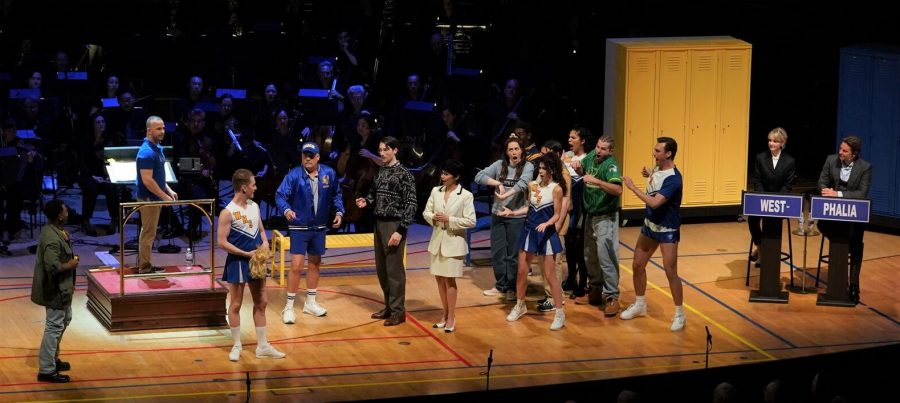
Bernstein: Candide. Philadelphia Orchestra, June 2019
I looked forward to hearing the broadcast of Yannick Nézet-Séguin’s interpretation of Candide. (Radio broadcasts normally follow a few weeks after each live concert.) And maybe, if we’re lucky, a recording of it. But the Orchestra chose to not broadcast it.
The performances of the orchestra and the singers earned this enthusiasm. At the first of three staged performances by the Philadelphia Orchestra, Nézet-Séguin produced rich sound, emphasizing deeper orchestral tones. He supplied vital, dance-like energy to the multifaceted score.
Yannick picked an excellent group of lead singers. Erin Morley has the perfect instrument and personality for Cunegonde. Her voice sparkled throughout, especially in “Glitter and Be Gay.” Denyce Graves provided the contrast of worldly experience as The Old Lady. She looks great at 55 and her dark mezzo was solid in “I Am Easily Assimilated” (with Bernstein’s own lyrics) and the three-quarter-time “What’s the Use?”
Another veteran performer, William Burden, was impressive as an athletic coach who played The Governor. His tenor voice was clear and ringing in “My Love.” The lyric tenor Alek Shrader sounded fine as Candide when he wasn’t forced to act stupid and distort his voice. (More about the direction in a moment.) Baritone Kevin Vortmann did some lovely singing as Dr. Pangloss and Timothy McDevitt sang attractively as Maximilian.
The visual production was another matter. It undermined the high quality of the musical performance. Conductor Nézet-Séguin and stage director Kevin Newbury chose to re-set this Age of Enlightenment story as a high school experience, Class of 1992. It reminded me of the movies Fast Times at Ridgemont High, Grease, and Ferris Bueller’s Day Off. Slapstick action played across the Academy of Music stage, as scenery (such as hall lockers) was wheeled on and off. The Philadelphia Orchestra was crammed together behind the actors, with the celli and basses facing out instead of towards the conductor’s podium. The 56-person chorus filled the balcony above the stage.
I sympathize with the quest to find a new approach to Voltaire’s tale because the original production of Candide in 1955 was weighted down by a serious, heavy-handed script by Lillian Hellman. But other versions have been more successful. Bernstein enlisted other librettists, including Stephen Sondheim, to re-write the book and lyrics, and a production directed by Harold Prince ran two years on Broadway. Another version was prepared for a gala New York Philharmonic concert by former-performer Lonny Price, and he took a smart-alecky approach. Unfortunately, that’s the version used as basis for this production.
Voltaire’s story was a critique of the church, and of excessive tolerance and passivity inspired by Gottfried Leibniz’s philosophy of optimism.
The update to a high school gymnasium trivializes the story, adds nothing to its relevance and, worst of all, distracts from the sparkling music. Cheerleaders prance while a dozen superfluous performers clutter the stage. Nerdy young men are portrayed in an offensively clichéd manner, and so are two characters who swish in the worst possible exaggeration of stereotypical gayness.
The title character is supposed to be a simple-minded innocent, not the goofy idiot that Shrader was directed to play. The role of Dr. Pangloss — a stand-in for Voltaire — is minimized in this version, and Vortmann displayed none of the drollery or irony that others (such as Max Adrian, Jim Dale, Adolph Green) have brought to this part.
The serious problems of war and rape that were satirized by Voltaire and by Bernstein are here trivialized into hallway pranks and football scrimmages. I did appreciate some of the jokes, like changing the original Westphalia in northern Germany to “West Phalia” high school and, at one point, referring to it as West Phalia-delphia.
The best moment came in the finale, as “Make Our Garden Grow” accompanies a graduation ceremony. This inspirational Bernstein anthem actually is used at many real graduations.
Lenny wrote many new songs as Candide went through its re-writes, which went unheard in this version except for the lovely duet, “We Are Women.” A pity, since the musical talent here was so great. Even some good music from the original version was excised. I wish we could have heard more Bernstein and had less foolish business, like Nézet-Séguin donning a drum-major’s hat and being offered a joint.
The production featured narration by movie star Bradley Cooper which is appropriate because he is producing and starring in a Hollywood film about Bernstein’s life. But his spoken commentary added little to the proceedings. There was even less need for the soft, British-accented voice of actress Carey Mulligan as a second narrator.
Originally published in The Opera Critic, the international website for professional musicians.